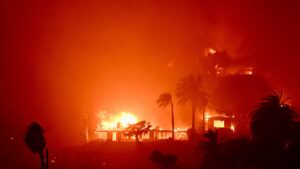Rebuilding Lives After the Flames: Navigating Financial Challenges in the Wake of the Palisades Fire
The recent wildfires that swept through the Pacific Palisades area of Los Angeles disrupted thousands of lives and left many families grappling with anxiety, uncertainty, and financial strain. For residents like Alicia Kalvin, who awoke to the horrifying sight of her neighborhood engulfed in flames, the road ahead is paved with challenges that extend far beyond the physical destruction that accompanied the fire.
A Heart-Wrenching Escape
On January 7, 2025, Kalvin’s world changed in an instant. A message from a friend warned her of the impending threat, and what followed was a frantic scramble to evacuate her childhood home. With her dog, a can of food, and her mother’s ashes in tow, she fled, witnessing the flames consuming her neighbor’s house. Three days later, accompanied by law enforcement, she returned to a scene that resembled a war zone—landmark establishments that once defined the community were reduced to rubble.
“Somehow my home is still standing,” said Kalvin, relieved yet anxious. “But the damage is extensive, and I have so many questions about my insurance coverage.”
The Complexities of Home Insurance
Despite surviving the blaze, the financial implications for Kalvin and many others are daunting. Understanding the terms of her California FAIR Plan policy—deployed when traditional insurance is unavailable—has been a rollercoaster of frustration. Kalvin’s concerns reflect a broader issue in disaster-stricken areas: many individuals are underinsured or misinformed about what their policies cover.
Top Financial Tips for Wildfire Victims:
- Review Your Coverage: Understanding your policy after being insured is crucial. Consult a financial advisor or insurance specialist to analyze what your plan does and does not cover.
- Document Everything: Keep detailed records of your property damage and any related costs, which will aid in claiming your insurance benefits.
- Explore FEMA Assistance: Victims may qualify for FEMA aid during these desperate times. It’s a temporary but necessary relief to cover essential costs like shelter and food.
A Community Devastated: The Financial Fallout
The impact of the Palisades Fire extends beyond personal experiences. Experts estimate damages at over $250 billion, making these wildfires one of the costliest in U.S. history. Many residents face a brutal reality where costs pile up, and they often find themselves without adequate financial cushioning. Andrew Rumbach, a senior fellow at the Urban Institute, notes that without emergency savings, many Americans resort to debt—a solution with long-term consequences.
Sam Bakhshandehpour, a local restaurateur, hints at the complexity of restoration, saying, “Whether we rebuild or leave, it’s overwhelming.” Homeowners face a slew of options—institutions of local infrastructure are damaged, and for many, re-zoning might mean future homes could be unattainable.
The Emotional and Financial Tug-of-War
Coupled with the logistical nightmare of obtaining and affording temporary housing comes an emotional toll. Julia Pollak, a labor economist and local resident, describes her devastated neighborhood as a “ghost town hellscape.” With her home still habitable but damaged, she remains torn: stay in a reconstruction zone or leave behind her community.
-
Long-Term Housing Strategies: Consider housing stability first. Temporary measures like short-term rentals or living with friends might become necessary, though they can be financially straining, leading to decisions like liquidating your 401(k). Always consult with a financial advisor before taking such drastic measures.
- Evaluate Potential Assets: Depending on your situation, selling or renting out your remaining property in a fire-impacted area might be a consideration. Weigh your options carefully before committing to a long-term lease elsewhere.
Conclusion: A Call for Preparedness
As the smoke clears, the road to recovery for Pacific Palisades residents lies ahead. Those affected must navigate a complex landscape of insurance coverage, financial uncertainty, and emotional distress. But being prepared can mitigate some of these obstacles:
- Build an Emergency Fund: Financial experts urge all homeowners, especially in disaster-prone areas, to save for unforeseen circumstances.
- Engage in Community Support: Resources may be limited, but local organizations can provide valuable assistance in the wake of disaster.
- Stay Informed: Legal changes surrounding insurance policies following major disasters occur often. Familiarize yourself with these modifications to safeguard your financial future.
At Extreme Investor Network, we understand that these are more than just financial losses—they are wounds to the community. We stand alongside you as you work to rebuild and reclaim your lives. Stay informed, stay prepared, and remember, you are not alone in this journey. Through resilience and resourcefulness, recovery is possible.

